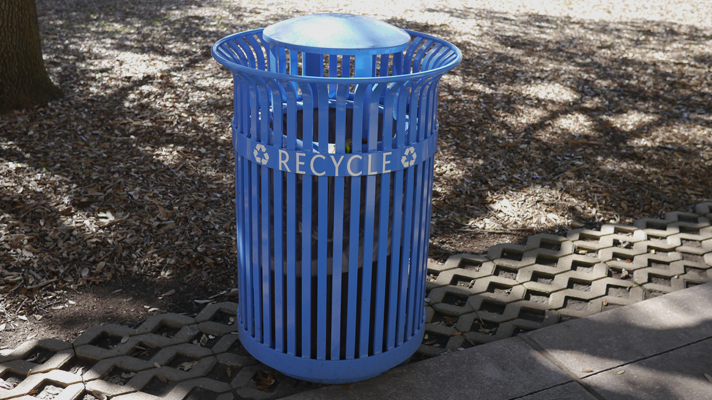In 2019, the Sustainability Department completed a waste audit to better understand our waste stream. From the waste audit, we found that the diversion was low, contamination was high, and that there was a clear need to completely revamp how the university addresses its waste. Southwestern University is committed to being an environmentally sustainable institution that continually seeks to adopt effective, innovative measures on its path toward zero waste. As such, the university has adopted the following zero waste initiatives:
Reduce
Water Bottle Stations
In order to encourage the Southwestern Community to move away from single-use water bottles, the campus installed bottle refill stations. These stations have an extra filtration component and make refilling reusable bottles easier, serving as a good visual reminder to students to carry a reusable water bottle and preventing thousands of plastic water bottles from ending up in landfills.
Trash Buddy Program
Facilities Management is in the process of transitioning all office trash containers to an unlined Trash Buddy, a miniature trash container that attaches inside or outside of a blue recycling bin. Trash Buddy (or “mini-bin”) programs have been successfully implemented at many colleges and universities both in the U.S. and abroad, as well as at other organizations in the public and private sectors. These programs have been shown to significantly increase recycling rates, decrease trash production, and save money.
Reuse
Non-Profit Partnerships
Southwestern University has two Goodwill bins on campus that students use for donating unwanted clothes, shoes, books, and toys. This helps low-income families while increasing our overall diversion rate. During summer and winter breaks, surplus furniture and appliances are donated to the Habitat for Humanity ReStore in Georgetown. Habitat for Humanity ReStores are nonprofit home improvement stores and donation centers that sell new and gently used furniture, appliances, home accessories, building materials, and more to the public at a fraction of the retail price.
Reusable Dishware Rentals
In Fall 2018, Leah Horick ’21 received a Green Fund grant to purchase 100 reusable plates, bowls, cups, and sets of cutlery with the goal of reducing event waste. Any group on campus (including student organizations, academic departments, sororities, fraternities, etc.) holding an on-campus event in a public space can rent the reusable dishware.
Recycle/Compost
Bag-the-Bag Bins
In Summer 2019, twenty black and gold “Bag-the-Bag” bins were installed in breakrooms and kitchens across campus to allow the SU community to responsibly recycle all film plastics (including plastic bags, plastic packaging, and saran wrap).
Compost Digester
We are proud to have a community garden at Southwestern where students learn valuable skills that will last a lifetime. The Compost Digester is an asset to the health of our beloved garden. The Garden Club and student volunteers utilize the digester to break down plant food waste, food-soiled paper, and other organics into nutrient-rich soil. Nothing is put to waste and participants can reap the benefits of freshly grown produce. Learn how to make your own compost with this guide .
Single-Stream Bins
Blue single-stream recycling bins are strategically placed throughout campus so that students, faculty, and staff are able to properly dispose of their waste items. The SU community is encouraged to recycle whenever possible rather than throwing recyclable items in a trash container. In Spring 2019, a Green Fund Grant was approved to purchase new Busch System Receptacles. These heavy-duty containers are positioned in common areas and in classrooms.
Landfill
Dog Waste Stations
Dog waste is designated by the EPA as an environmental contaminate. At Southwestern, we love dogs visiting our campus. However, to prevent disease and environmental pollution, dog waste stations have been installed throughout campus. We use dog waste bags made from 40% recycled plastic and contain EPI’s Totally Degradable Plastic Additive that helps the plastic degrade faster in a non-toxic process.















